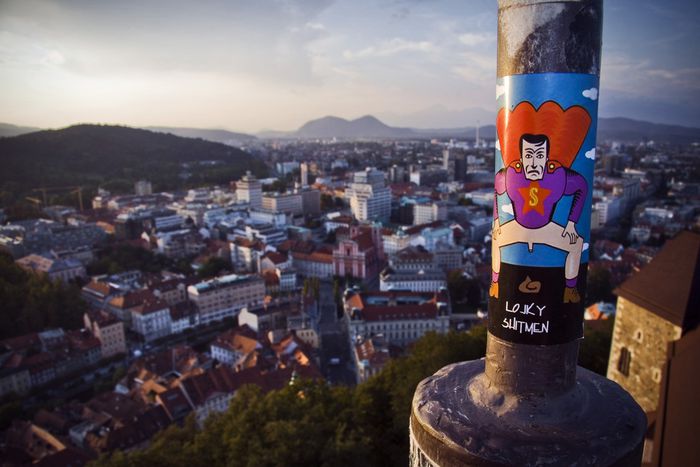
Miro Cerar: A Breathe of Fresh Air or Business as Usual in Slovenia?
Published on
A lawyer and a legal expert, university professor and author, musician, advisor for the government, athlete, son, husband and father — all of the above can describe Dr Miro Cerar. But this May he added a new role: politician. So how did he get here?
Miro Cerar is an unlikely candidate for Prime Minister in Slovenia. Sports, law and politics were part of his childhood, as was minor stardom due to his famous parents. Born on the 25th of August 1963 in Ljubljana to one of the country's best gymnasts, Miroslav Cerar, and to Zdenka Cerar, a state prosecutor and the first Slovenian woman Minister of Justice. His father was also a lawyer, but is more known for his athletic achievements: he won three Olympic medals, seven world championships and nine European championships medals and was one of the founders of Slovenian Olympic Committee. His mother was vice president of the political party Liberal Democrats, but also a two time state champion in gymnastics. As a child, Miro was not so talented at gymnastics, so he played basketball, which he still enjoys with his children. But he wasn't only into sports, he went to music school, where he learned how to play the accordion and later, the guitar to impress girls. In university, he even had a band called Alan Ford. However, as exit polls show, he and his newly-formed Miro Cerar's Party are the winners of Sunday night's election.
Miro Cerar studied law at the University of Ljubljana, and after finishing, he became an assistant professor. In 1990, he got the opportunity to help write the Constitution of Republic of Slovenia and later other important legislation. Today, he is a fulltime professor at the Faculty of Law and a renowned author and scholar, including a stint in 2008 as a Fulbright visiting professor at Golden Gate University in San Francisco. For his work he has received different awards, including best educator at the Faculty of Law, three times as the most prominent Slovenian legal expert and twelve times selected as one of Slovenia’s most influential jurists.
 He is one of the many non-professional politicians that are a rising phenomenon in the European countries over the last years. Their popularity mainly comes from not having a political past that is usually connected to corruption, failed laws, bad governance, deepening the countries’ debt and raising its taxes. These new politicians are not being tied to the deepening crises but represent a new face and hope for the country. He officially entered the Slovenian political sphere on June 2nd when his political party, called the Miro Cerar's Party (SMC), was founded. From the beginning, election polls estimated that he would receive more than 30% of votes in the parliamentary elections. He will probably be the next Prime Minister and will be responsible for forming a new coalition. Who he will form it with is the most popular question nowadays in the country.
He is one of the many non-professional politicians that are a rising phenomenon in the European countries over the last years. Their popularity mainly comes from not having a political past that is usually connected to corruption, failed laws, bad governance, deepening the countries’ debt and raising its taxes. These new politicians are not being tied to the deepening crises but represent a new face and hope for the country. He officially entered the Slovenian political sphere on June 2nd when his political party, called the Miro Cerar's Party (SMC), was founded. From the beginning, election polls estimated that he would receive more than 30% of votes in the parliamentary elections. He will probably be the next Prime Minister and will be responsible for forming a new coalition. Who he will form it with is the most popular question nowadays in the country.
Miro Cerar thinks that his support among citizens comes from the fact that he is a new face with a new political party. People feel that he can be the last chance for Slovenia. As his party is only a month and a half old, they don’t have a history of unfulfilled promises, and people remember him and other members of SMC as a credible commentators of political events. It is interesting that 41% of SMC’s members on the electoral list have a Masters or Doctorate of Science, which is a much higher percentage than in other Slovenian political parties. There are a lot of predictions, but Cerar doesn’t want to give away any names. As SMC is a political party in the centre, they say differentiating left and right wing parties only makes a country ideologically divided; thus, a lot of different connections are possible. They believe in combining the elements of left and right parties, but their first priority is to lead Slovenia out of the crisis and establish a higher political and juridical culture.
So why did Cerar decided to go into politics? As an advisor for the National Assembly, he was always connected with politics, but one year ago he started getting many offers: four different political parties invited him to join them. He was also offered a post in possible 'project government' after the fall of Janez Janša’s government in 2013. He didn’t feel that last year was the right time to enter politics, but has been closely watching what the new government was doing to get Slovenia out of the crisis. Meanwhile, he was gathering a group of people with whom he shares views about the future of the country. After the resignation of the government this May, he decided that something had to be done. Slovenia needed an alternative political party to lead the country out from the crisis, as the current political parties are not helping, instead, being preoccupied with arguing amongst themselves. As Cerar tweeted for his electoral campaign: “Appearance is empty, if there is no content behind it.” In the next few weeks, we will see if behind Cerar’s façade, there is real substance that will be positive for Slovenia.



